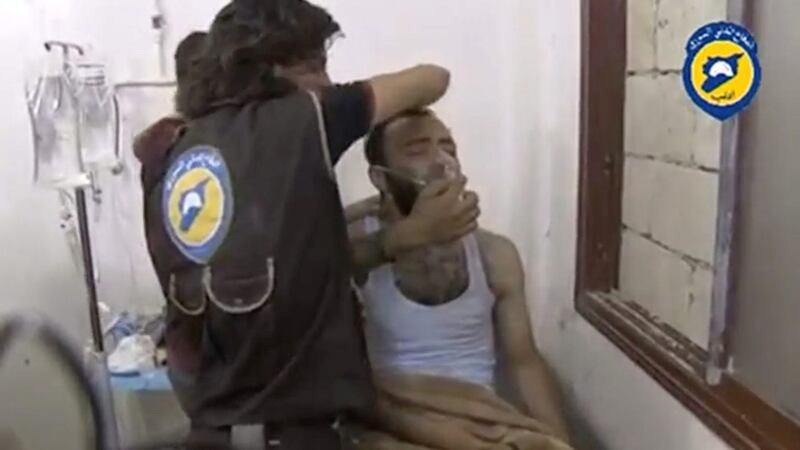BEIRUT // A Syrian rescue service operating in rebel-held territory said on Tuesday a helicopter dropped containers of toxic gas overnight on a town close to where a Russian military helicopter was shot down hours earlier.
A spokesman for Syria Civil Defence said 33 people, mostly women and children, were affected by the gas in Saraqeb, in rebel-held Idlib province.
The group, which describes itself as a neutral band of search and rescue volunteers, posted a video on YouTube apparently showing a number of men struggling to breathe and being given oxygen masks by people in civil defence uniforms.
The rescue workers, who went to the scene of the attack, said they suspected the gas was chlorine but could not verify that.
“Medium-sized barrels fell containing toxic gasses. The Syrian Civil Defence was not able to determine the type of the gas,” said the spokesman.
The Syrian government and its Russian allies were not immediately available for comment.
The Civil Defence spokesman said it was the second time Saraqeb had been hit by toxic gas. The group was aware of around nine suspected chlorine gas incidents across Idlib province since the conflict began, he said.
Monitors at the Syrian Observatory for Human Rights, which tracks violence on all sides in the civil war, said barrel bombs fell on Saraqeb late on Monday, wounding a large number of citizens.
Russia’s defence ministry said a Russian helicopter was shot down near Saraqeb during the day on Monday, killing all five people on board, in the biggest loss of life for Russian forces since they started operations in Syria.
The helicopter came down in Idlib province, roughly midway between Aleppo and Russia’s main airbase at Khmeimim in the western province of Latakia, near the Mediterranean coast.
Russian air power began supporting Syrian President Bashar Al Assad late last year, an intervention which tipped the balance of the war in Assad’s favour, eroding gains the rebels had made that year.
The Russian defence ministry said the Mi-8 military transport helicopter was shot down after delivering humanitarian aid to Aleppo as it made its way back to Khmeimim.
No group has claimed responsibility for downing the helicopter.
Government and opposition forces have both denied using chemical weapons during the five-year-old civil war. Western powers say the government has been responsible for chlorine and other chemical attacks. The government and Russia have accused rebels of using poison gas.
UN investigators established that sarin gas was used in Eastern Ghouta in 2013. The United States accused Damascus of that attack, which it estimates killed 1,429 people, including at least 426 children. Damascus denied responsibility, and blamed rebels.
Later that year the United Nations and the Syrian government agreed to destroy the state’s declared stockpile of chemical weapons, a process completed in January 2016.
The Organisation for the Prohibition of Chemical Weapons confirmed in late 2015 that sulphur mustard, commonly known as mustard gas, had been used for the first time in the conflict, without saying which party in the many sided conflict it thought had used it.
Meanwhile, Russia launched heavy air strikes overnight on the outskirts of Aleppo, slowing a “last-chance” assault by rebels seeking to break a government siege.
The assault began on Sunday and is intended to ease the encirclement of the opposition-held east of Aleppo city, where an estimated 250,000 residents have been under a regime siege since July 17.
The strikes came despite an appeal by US Secretary of State John Kerry on Monday for Russia to “restrain” itself and its ally in Damascus from “offensive operations.”
The Observatory said 50 rebels and allied jihadists had been killed since the operation began on Sunday, as well as dozens of regime troops.
*Reuters and Agence France-Presse





